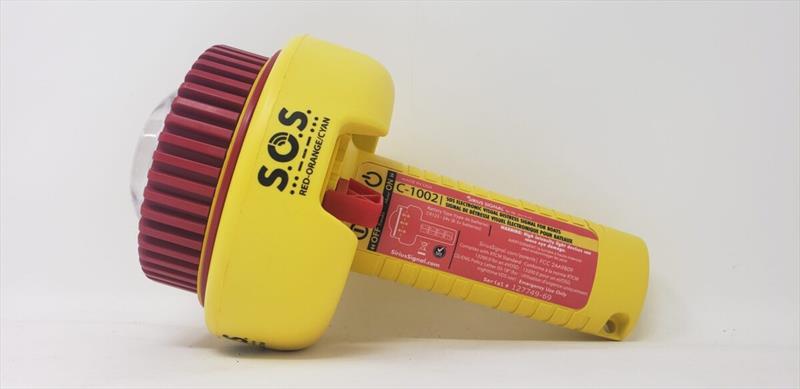
Changes to Canadian pleasure craft distress signals (smoke, flare or electronic) requirements
by K. Barrie Letts / Bluewater Cruising Association 20 May 2022 07:38 NZST

Changes to Canadian pleasure craft distress signals (smoke, flare or electronic) requirements © SiriusSignal.com
There have been two significant changes to the Canadian Pleasure Craft (Small Vessel) Regulations that BCA members may not be aware of:
- The reduction of the number of Pyrotechnic Distress Signals required, if certain communications gear is carried on board
- Approval of Electronic Flares
This article introduces these changes and discusses some of the pros and cons of the Electronic Flare option.
Readers are reminded that the vessel operator is responsible for ensuring that all required safety gear is on board and meets current requirements.
Pyrotechnic distress signals
The Small Vessel Regulations, under the Canadian Shipping Act, 2001, requires a certain number of Pyrotechnic Distress Signals (Smoke/Flare) be carried on a Vessel. The number and type are determined by the length of the Vessel. In the current version of the Safe Boating Guide, the number of required Pyrotechnic Distress Signals can be reduced, as outlined in part of Note 2 on page 19, if the Vessel has one of three identified means of electronic communication:
"The number of flares required may be reduced by 50 percent (the number of smoke signals cannot exceed 50% of the number of smoke signals given in the tables above) if the boat has one of the following:
- A means of two-way communication*
- A 406 MHz personal locator beacon** that is worn by the boat operator; or
- A 406 MHz emergency position-indicating radio beacon***
* The means of two-way communication may include a Very High Frequency (VHF) marine radio, a satellite telephone or a cellular telephone (if the VHF radio or the cellular telephone is located in a coverage area.)
** A 406 MHz personal locator beacon (PLB) must meet the requirements under the Radio Communication Act. All Canadian coded PLBs should be registered with the Canadian Beacon Registry or by calling 1-877-406-7671 (toll free). Registering a beacon is free of charge. Canadian-coded beacons cannot be registered elsewhere.
*** A 406 MHz emergency position-indicating radio beacon (EPIRB) must meet the requirements of the Ship Station Radio Technical Regulations and must also be registered with the Canadian Beacon Registry. See above. Ensuring that your 406 MHz PLB, or EPIRB is registered, as well as updating the information regularly, will facilitate the task for search and rescue personnel in the event of a distress situation. For further information regarding VHF radios or EPIRBS please visit here"
This represents a 50% reduction in the number of flares required for many BCA members and other pleasure craft operators.
Electronic Flares
Effective November 9, 2021, the Acceptance of Electronic Visual Distress Signals in lieu of Pyrotechnic Distress Signals (Smoke signals or flare) on Pleasure Craft Policy was put into effect. The policy will be reviewed in five years.
In summary, the policy allows for the replacement of all Pyrotechnic Distress Signals (except one approved smoke signal), with one approved* Electronic Visual Distress Signal.
*Note: USCG Approval is not valid in Canada. Transport Canada has only approved the two colour, plus infrared version meeting certain standards. Readers are advised to check with the retailer or manufacturer to ensure that the unit they are considering has been approved for use in Canada. At current pricing, the writer has not found a unit under $400 CDN that has Transport Canada approval.
Advantages and disadvantages of electronic visual dress signals
Potential advantages include:
- One time purchase. No fixed expiration date.
- Reduced risk of fire. Pyrotechnic signals are classed as explosives.
- Reduced environmental risk. Pyrotechnic signals must be replaced every 4 years and expired ones disposed of as a dangerous good. (Somewhat offset by the need to replace and dispose batteries in Electronic signals.)
- More compact than numerous flares.
- Less onerous storage requirements. (Somewhat reduced by the requirement to maintain an approved smoke signal.)
- Less dangerous to operate. No blinding light, heat or fumes.
- Reduced training to operate.
Potential disadvantages include:
- Range is line of sight at or near sea level, similar to a hand held Pyrotechnic signal. Parachute, Twin Star and pistol flares would generally have a greater visual range.
- Cost: The approved Electronic Flares cost between $400 and $700. For boaters requiring 6 Pyrotechnic signals, the replacement cost of the five extra (remember one smoke signal is still required with the Electronic flare) at say $100, every 4 years (pistol or twin star) it will take 12 to 28 years to offset the purchase cost; assuming the cost of Pyrotechnic disposal and Electronic battery replacement/disposal would offset each other.
Conclusions
The reduction in Visual Distress Signal requirements recognizes the reliability of electronic communications and their increased role in search and rescue operations. This is a welcome change for most boaters from an environmental, safety and cost perspective. Electronic Visual Distress Signals are a potential replacement for hand-held flares; regrettably, the current cost will be considered excessive for many boaters.
This article has been provided by the courtesy of Bluewater Cruising Association.